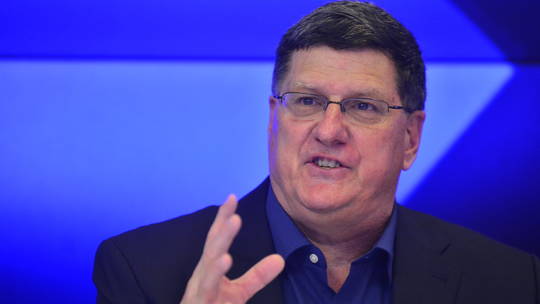
By Ahmed Elumami and Ayman al-Warfalli
TRIPOLI/BENGHAZI, Libya (Reuters) – Eastern Libyan troops commanded by Khalifa Haftar said on Friday they had advanced into the southern outskirts of the capital Tripoli in a dangerous thrust against the internationally-recognized government.
Fighting was going on near the former international airport.
The moves by Haftar’s Libyan National Army (LNA) force, which is allied to a parallel administration based in the east, escalated a power struggle that has splintered the nation since the overthrow of Muammar Gaddafi in 2011.
It came as U.N. Secretary-General Antonio Guterres departed after meeting Haftar to try and avert civil war.
“I leave Libya with a heavy heart and deeply concerned. I still hope it is possible to avoid a bloody confrontation in and around Tripoli,” he said on Twitter.
Haftar, 75, who casts himself as an opponent of Islamist extremism but is viewed by opponents as a new Gaddafi, was quoted by Al-Arabiya TV as telling Guterres the operation would continue until terrorism was defeated.
The coastal capital Tripoli is the ultimate prize for Haftar’s eastern parallel government.
In 2014, he assembled former Gaddafi soldiers and in a three-year battle seized the main eastern city of Benghazi.
This year, he took the south with its oilfields.
As well as visiting Haftar in Benghazi, U.N. boss Guterres had been in Tripoli this week to help organize a national reconciliation conference planned for later this month.
But that plan looked in jeopardy on Thursday as LNA forces took Gharyan, about 80 km (50 miles) south of the capital after skirmishes with forces allied to Tripoli-based, U.N.-backed Prime Minister Fayez al-Serraj.
From there, Haftar’s forces moved north, first taking the village of Suq al-Khamis, about 40 km from Tripoli, after some fighting, a resident and an eastern military source said.
Then on Friday, the LNA said it took the areas of Qasr ben Ghashir and Wadi al-Rabie on the southern outskirts of the capital, seizing the former Tripoli International Airport, which has been abandoned since a 2014 battle.
SETBACK TO MEDIATION PLAN
There was no independent confirmation of that, but a video posted online purportedly showed LNA fighters inside Qasr ben Ghashir suburb, which includes the airport.
However, the Tripoli interior minister, Fathi Bashagha, later told Ahrar TV his forces had retaken the old airport while there were clashes in the Qasr ben Ghashir area.
The LNA said it had lost five soldiers since Thursday.
While the advance has looked fast, so far Haftar’s force has mainly crossed sparsely-populated areas after taking Gharyan, the last town in the mountains before the road descends to a coastal plain.
In 2014 battles for Tripoli, it took advancing fighters weeks to reach the city center from the old airport as snipers bogged them down.
Forces from Misrata, a city east of Tripoli, sent more reinforcements to defend Serraj, residents said.
Major ministries are still 20 km away.
Despite their gains, Haftar’s forces failed to take a checkpoint about 30 km west of the capital in a bid to close the coastal road to Tunisia. An LNA-allied armed group withdrew overnight from so-called Gate 27, leaving it abandoned in the morning, a Reuters reporter said.
And in another setback, forces allied to Tripoli took 145 LNA fighters prisoner in Zawiya, west of the capital, a western commander, Mohamed Alhudair, told Reuters.
An LNA source confirmed 128 had been captured.
Armed groups allied to the Tripoli government have moved more machinegun-mounted pickups from the coastal city of Misrata to Tripoli to defend it against Haftar’s forces.
The offensive is a setback for the United Nations and Western nations trying to mediate between Serraj, 59, who comes from a wealthy business family, and military veteran Haftar.
They met in Abu Dhabi last month to discuss power-sharing.
The United Nations wants to find agreement on a road map for elections to resolve the prolonged instability in Libya, an oil producer and transit point for refugees and migrants trekking across the Sahara with the aim of reaching Europe.
Haftar enjoys the backing of Egypt and the United Arab Emirates, which see him as a bulwark against Islamists and have supported him militarily, according to U.N. reports.
The UAE, however, joined Western countries in expressing its deep concern about the fighting.
Germany called an emergency meeting of the U.N. Security Council due to the military escalation. Russia said it was not helping Haftar’s forces and it supported a negotiated political settlement that ruled out any new bloodshed.
Tunisia has tightened control on its border with Libya in response to the renewed conflict, the defense ministry said.
Former colonial power Italy, which lies across the Mediterranean and has been a destination for migrants, was very worried, Italian Deputy Prime Minister Matteo Salvini said.
“We need to throw water on the fire, not petrol on the fire. I hope that people, acting out of economic or business self-interest, are not looking for a military solution, which would be devastating,” Salvini said.
(Additional reporting by Hesham Hajali in Cairo; Writing by Ulf Laessing; Editing by Angus MacSwan, Alison Williams and Andrew Cawthorne)





